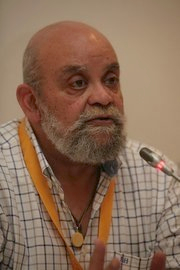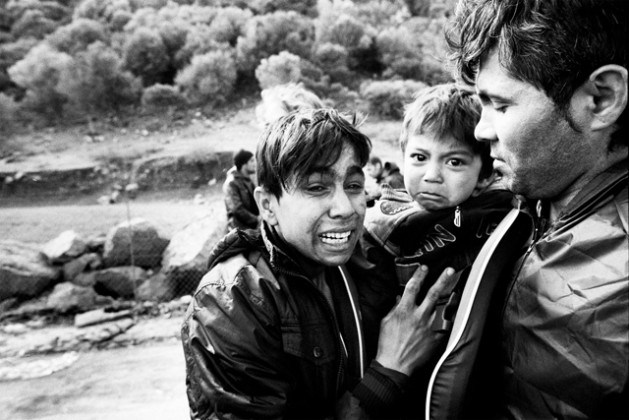By Baher Kamal*
Hardly a statement could have portrayed more accurately the current wave of hatred invading humankind, like the one made by the UN High Commissioner for Human Rights, Zeid Ra’ad Al Hussein.
“… Clampdowns on public freedoms, and crackdowns on civil society activists and human rights defenders, are hacking away at the forces, which uphold the healthy functioning of societies. Judicial institutions, which act as checks on executive power, are being dismantled. Towering inequalities are hollowing out the sense that there are common goods.” Zeid Ra’ad Al Hussein warned.
In his address to the 32 session of the Geneva-based UN Human Rights Council (13 June to 1 July 2016), the Human Rights Commissioner warned, “As the international community’s familiar customs and procedures are much in evidence… And yet the workable space in which we function as one community – resolving disputes, coming to consensus – is under attack.”
Zeid explained, “The common sets of laws, the institutions – and deeper still, the values“ which bind us together are buckling. And suffering most from this onslaught are our fellow human beings – your people – who bear the brunt of the resulting deprivation, misery, injustice, and bloodshed.”

He the recalled, “We are 7.4 billion human beings clinging to a small and fragile planet. And there is really only one way to ensure a good and sustainable future: ensure respect, resolve disputes, construct institutions that are sound and fair and share resources and opportunities equitably.”
The UN Human Rights Commissioner referred to the millions of stranded refuges and migrants, saying that globally, many countries have distinguished themselves by their principled welcome to large numbers of desperate, often terrified and poverty-stricken migrants and refugees.
“But many other countries have not done so. And their failure to take in a fair share of the world’s most vulnerable is undermining the efforts of more responsible States. Across the board, we are seeing a strong trend that overturns international commitments, refuses basic humanity, and slams doors in the face of human beings in need.”
‘Europe Must Remove Hysteria and Panic’
The only sustainable way to resolve today’s movements of people will be to improve human rights in countries of origin, “ he said, while stressing that “Europe must find a way to address the current migration crisis consistently and in a manner that respects the rights of the people concerned – including in the context of the EU-Turkey agreement,” which was sealed on March 22, 2016.
“It is entirely possible to create well-functioning migration governance systems, even for large numbers of people, with fair and effective determination of individual protection needs. If European governments can remove hysteria and panic from the equation – and if all contribute to a solution…”
According to Zeid, in many parts of the Middle East and North Africa, the life-forces of society – which are the freedom and hopes of the people – are crushed by repression, conflict or violent anarchy. “Torture, summary execution and arbitrary arrests are assaults on the people’s security, not measures to protect security. It is a mistake to imagine that attacking the people’s rights makes them any safer or more content.”

“The antidote to the savagery of violent extremism is greater rule of law,” he said and added that “the best way to fight terrorism, and to stabilize the region, is to push back against discrimination; corruption; poor governance; failures of policing and justice; inequality; the denial of public freedoms, and other drivers of radicalization.”
De-Radicalisation
Radicalisation, or rather de-radicalisation, is precisely the focus of one of the panels organised within the current session of the Human Rights Council.
In fact, on June 23, 2016, the Geneva Centre on Human Rights Advancement and Global Dialogue has organized the event under the auspices of the Permanent Mission of Algeria to the UN Office in Geneva.
The panel will be moderated by Algerian diplomat and former head of a UN agency Idriss Jazairy, Resident Board Member of the Geneva Centre.
The panel organisers recall that “violent extremism had been until 2001 mainly in the lot of developing countries such as Uganda where a Christian mandate was usurped by the Lord’s Resistance Army to attack civilians and force children to participate in armed conflict, Sri Lanka, where the first suicide attacks originated, and Algeria where more Muslims were killed during a decade than Europeans worldwide ever since, through an evil manipulation of the precepts of Islam.”
Outside observers, they add, tended to belittle the impact of such violence considered as local incidents, at times preferring to ascribe it to “militants” responding to deficits of democracy and governance in the targeted countries.
During the last phases of the Cold War, violent extremism was condoned in some quarters as a weapon against communism, the panel concept note recalls, and adds that the recruitment of new cohorts of violent extremists was given added impetus by the Israeli-Palestinian stalemate, the collapse of Iraq and Libya and the wars in Afghanistan, Syria and Yemen.
“These developments, or lack thereof, occurred mainly in Muslim countries thus exacerbating violent extremism associated with this region and leading to an intensification of Islamophobia elsewhere, especially in Europe and North America.”
It remains, as underlined by the joint co-chairs conclusions of the Geneva Conference on Preventing Violent Extremism (7-8 April 2016), that “violent extremism or terrorism cannot and should not be associated with any religion, nationality, civilization or ethnic group.”

The reaction of the international community was slow in taking shape in the UN if only because of political differences in terms of acceptance of a common definition of terrorism, says the panel’s concept note.
In a key remark, the organisers warn, “The very lexicon of international affairs is being manipulated to provide knee-jerk reactions that nurture ideologies of racist and xenophobic parties in the advanced world. It also provides a propitious climate for explosion of violent extremism around the world.”
In Europe, over 20 million Muslims have lived for decades as citizens in harmony with followers of other religions as well as with non-believers and have been contributing to the wealth of their countries of residence, the panel organisers recall.
“They are now being targeted by virtue of their identity, not their deeds. They are alone to suffer from fear-mongering and the rise of xenophobia for diverse minority groups in different parts of the world. One needs in this context to understand better the causes and means by which violent extremism is perpetrated and spread.”
The focus has been so far on how to roll back radicalism and on fighting violent extremism by all possible means without a full understanding of the root causes of such violence, says the panel’s concept note.
“The roll-back of violent extremism calls for an in-depth approach informed by the genesis and evolution of radicalisation, its link with citizenship and possible tipping point into violence… There also needs to be a better understanding of short-cuts to violent extremism that do not transit through radicalisation.”
Related IPS Articles
- Islamophobia is a Political Tool
- A Decalogue to Understand Terrorism and Its Consequences
- What If Turkey Drops Its “Human Bomb” on Europe?
- The Humanitarian Clock Is Ticking, The Powerful Feign Deafness
- ‘Human Suffering Has Reached Staggering Levels’
- Middle East – The Mother of All Humanitarian Crises
- Any Ways to Combat Extremism?
*Baher Kamal’s report was published in IPS. Go to Original.
 *Baher Kamal, Egyptian-born, Spanish-national secular journalist. He is founder and publisher of Human Wrongs Watch.Kamal is a pro-peace, non-violence, human rights, coexistence defender, with more than 45 years of professional experience.
*Baher Kamal, Egyptian-born, Spanish-national secular journalist. He is founder and publisher of Human Wrongs Watch.Kamal is a pro-peace, non-violence, human rights, coexistence defender, with more than 45 years of professional experience.Baher Kamal is also Senior Advisor to the Director General of international news agency IPS on Africa and the Middle East.
More articles by Baher Kamal in Human Wrongs Watch:
What If Turkey Drops Its “Human Bomb” on Europe?
Humanitarian Aid – Business As Unusual?
World Oceans Day – A Death Sea Called Mediterranean
The Humanitarian Clock Is Ticking, The Powerful Feign Deafness
Humanitarian Summit, The Big Fiasco
Humanitarian Summit: Too Big to Fail?
Humanitarian Summit Aims to Mobilise Up to 30 Billion Dollars
Africa, Resolved to Address African Problems With African Solutions
‘We Cannot Keep Jumping from Crisis to Crisis’
‘Human Suffering Has Reached Staggering Levels’
Now 1 in 2 World’s Refugees Live in Urban Areas
Middle East – The Mother of All Humanitarian Crises
Mideast: 1 in 3 Pays Bribe to Access Basic Public Services
Climate: Africa’s Human Existence at Severe Risk
No Water in the Kingdom of the Two Seas – Nor Elsewhere
Will the Middle East Become ‘Uninhabitable’?
Can an Animal Heist Fable Help Solve the Middle East Crisis?
A “Colombian Triangle” for Daesh in Libya?
‘Take My Iraqis and Give Me Some Syrians’ – Europe to Turkey
New Nuclear Hysteria in the Middle East
Africa Launches Largest Trading Block with 620 Million Consumers
Big War Lords Playing Brinkmanship Game in Syria
Cameron at large: Want Not to Become a Terrorist? Speak Fluent English!
Women’s Rights First – African Summit
Africa, Only If It Bleeds It Leads?
Seven Top Challenges Facing African Women
Once Auctioned, What to Do with the ‘Stock’ of Syrian Refugees?
Silence, Please! A New Middle East Is in the Making
The Over-Written, Under-Reported Middle East (II): 99.5 Years of (Imposed) Solitude
The Over-Written, Under-Reported Middle East (I): Of Arabs and Muslims
Egypt in the Rear Mirror (I): The Irresistible Temptation to Analyse What One Ignores
Egypt in the Rear Mirror (II): Who Are the Not-So-Invisible Powers Behind the Troglodytes?
Fed Up With Empty Promises, The Arabs May Abandon Nuclear Non-Proliferation Treaty
Anti-Nukes Move from Norway to Bahrain
Middle East Nuclear Free Bid Moves to Finland – Yet Another Lost Chance?
Annual Spending on Nuclear Weapons, Equivalent To UN Budget For 45 Years
Watch The Sky–It May Rain Atomic Bombs
Save The Planet? Just Eat Cars, Drink Fuel!
Who Is Afraid of 300 Or 400 Or 500 Million Miserables?
Violence And Death For Millions Of Life-Givers
Whither Egypt (I) – Did You Say Dictatorship?
Whither Egypt (II) – Economic Bankruptcy
Politicians Promote Fossil Fuels with Half a Trillion Dollars a Year
Who Dares to Challenge a 32 Billion Dollars Business – Human Trafficking?
Palestine: Yet Another One Hundred Years of Solitude
Does Anyone Know Anything About A New Country Called South Sudan?
South Sudan: Yet Another Kitchen-Garden?
Somalia? Which Somalia? Some Facts About Everybody’s — Nobody’s Land
Requiem For Palestine (I): A Conflict Born With A Solution
Requiem For Palestine (II): Can Gruyere Be A Solution?
2016 Human Wrongs Watch











